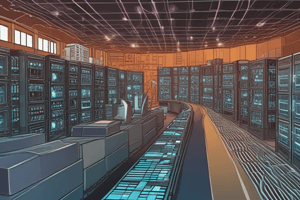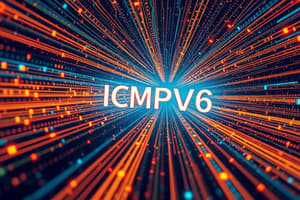Podcast
Questions and Answers
What is a computer?
What is a computer?
A device that allows you to interact with hardware and perform calculations or functions.
List three common components that make up a computer.
List three common components that make up a computer.
Central Processing Unit, Memory (RAM), Expansion Cards (e.g., video card).
What is system software in a computer?
What is system software in a computer?
It includes the operating system (e.g., Windows, Linux) and allows the computer to operate.
Why is it important to be careful with electrical safety when working with computers?
Why is it important to be careful with electrical safety when working with computers?
What caution should be taken when dealing with AC adapters for laptops?
What caution should be taken when dealing with AC adapters for laptops?
Why is it not advisable to exchange AC adapters between different laptops?
Why is it not advisable to exchange AC adapters between different laptops?
What precaution should be taken when dealing with printer parts like power supplies?
What precaution should be taken when dealing with printer parts like power supplies?
Why should one avoid opening up power supplies without proper training?
Why should one avoid opening up power supplies without proper training?
What is ESD (Electrostatic Discharge) and why is it a concern?
What is ESD (Electrostatic Discharge) and why is it a concern?
Why is it necessary to handle electronic devices carefully?
Why is it necessary to handle electronic devices carefully?
Study Notes
What is a Computer?
- A computer is an electronic device that can store, process, and retrieve data.
- It follows instructions and works with electronic signals.
Components of a Computer
- Central Processing Unit (CPU): The "brain" of the computer, responsible for processing instructions and performing calculations.
- Memory: Stores data and instructions that the CPU is currently using.
- Storage Devices: Save data for long-term use, examples include hard drives, SSDs, and flash drives.
System Software
- System software runs in the background and manages the computer's basic functions.
- Examples include operating systems (Windows, macOS, Linux) and device drivers.
Electrical Safety
- Electrical currents can be dangerous and cause injury or damage.
- Computers use electricity and require caution.
AC Adapters
- AC adapters convert household power to the voltage needed by laptops.
- Caution: AC adapters can overheat and pose fire hazards if damaged or used improperly.
Why Not Interchange AC Adapters
- Different laptops use different voltages and power specifications.
- Using the wrong AC adapter can damage the laptop.
Printer Power Supplies
- Similar to laptop power supplies, printer power supplies can be dangerous if mishandled.
Avoiding Open Power Supplies
- Power supplies contain high voltage and capacitors that can store a lethal charge.
- Never open power supplies unless trained and qualified.
ESD (Electrostatic Discharge)
- Static electricity build-up can cause damage to electronic components.
- Concern: ESD can harm delicate circuits on computer boards and other devices.
Handling Electronic Devices
- ESD can be discharged through touch, therefore handling electronic devices carefully helps prevent damage.
- Use grounding straps or other methods to minimize static build-up.
Studying That Suits You
Use AI to generate personalized quizzes and flashcards to suit your learning preferences.
Description
Explore Chapter 1 of the Cisco Netacad IT Essentials 7.0 course focusing on an introduction to personal computers. Learn about PC components, the definition of a computer, and the functions it performs.




